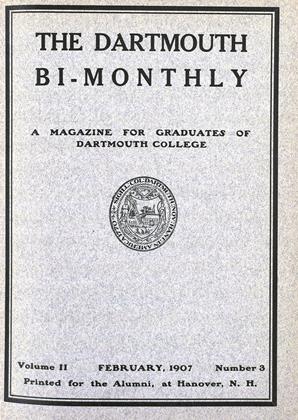Mr. Kellogg Durland, American correspondent in Russia for Collier's Weekly, Harper's Weekly, and the Review of Reviews, spoke on 'Russia in Revolution" before a large and interested audience in College Hall Saturday evening, February 9. Mr. Durland is an accomplished speaker; his clear and rapid delivery constantly held the interest and enthusiasm of the audience. His address was illustrated with lantern slides made from original photographs.
Mr. Durland's first topic concerned the conditions existing in the Caucasus region, and in the provinces bordering the Caspian Sea. While there he was a member of a Cossack company of officers, wearing their uniform and living their life. In this region revolutionary disturbances are of daily occurrence and are accentuated by the fact that the cities of the region are divided into quarters according to races. This latter feature is a cause of constant friction, precipitating incessant internal disturbances. "The Caucasus are not yet conquered and will not be for some time to come, "was his final statement of the existing conditions.
Mr. Durland next spoke of the cruelties of the Russian officers and soldiers. He told many episodes illustrating the barbarous and inhuman treatment to which both men and women are subjected, and which frequently result in the loss of lives. By these forceful measures the despotic government remains supreme. Eighty per cent of the people are against the Court party and yet this party has sufficient power to hold the people in subjection. A person suspected of revolutionary tendencies is arrested, thrown into prison, and then sent to Siberia. As one Russian general remarked, "The purpose of the soldiers is to pacify or to exterminate." The arrests each month number about 25,000. One doctor was murdered in Moscow by the soldiers, in his own home, for having attended people suspected of sympathizing with the Revolutionists. In Poland, the cavalry invariably ride in open order, ten paces between each two men, solely on account of the bomb throwing prevalent in that region.
One of the humorous incidents which Mr. Durland described concerned his arrest on five specific charges,—first, he paid the unheard of sum of seventy-five cents for two meals; second, he gave a priest a rouble (fifty cents) for a photograph, hence he was Anti-Christ; third, he smoked a gold-mounted pipe; fourth, he wore a wig; and fifth, he looked like a Jew. The relation of this story, at his own expense, occasioned much laughter.
That "Terrorism," as it exists today in Russia, is justifiable, was strongly asserted by the speaker. He maintained that "Terrorism" is by no means the work of scattered fanatics. The membership of the Terroristic organization numbers 200 men and women, with a long waiting list. The victims of this body are usually men of high rank who have been responsible for an extraordinary amount of bloodshed and cruelty, and whose removal will bring about more favorable conditions in the districts where they have been supreme. Every assassination is so well planned that the escape of the intended victim is almost impossible.
The Czar, affirmed the speaker, could be killed in twenty-four hours, if the "Terrorists" so desired. However, they do not deem this expedient, owing to the uncertainty of better conditions even after his death. The Czar is virtually a prisoner in a small house. "Together with the Czarina, who is one of the most beautiful women in Europe, he makes the best of a rather bad situation."
The peasants have hitherto felt for the Czar a pious reverence, even calling him their "Little Father." In the first Duma this feeling of reverence was sadly disturbed by their ruler's haughtiness when reading his message to that body, and by his scornful treatment of their petition. Accordingly, at the next Duma the peasants are going to demand a ministry responsible to the people.
The speaker vividly portrayed the sufferings resulting from the famine. Although the Czar is one of the wealthiest men in the world, he has made no attempt to relieve the distress of 30,000,000 peasants who are unable to procure a livelihood under the existing conditions. The Famine Relief Organization is the only means of subsistence to a large portion of these sufferers. Even then only one meal in forty-eight hours can be served.
Mr. Durland, in closing, expressed the belief that Russia in the end would receive the written Constitution for which the majority of her people are fighting, but that history showed that the progress of a revolution is slow in bringing about results. He also maintained that, in his opinion, the present conditions in Russia are barbarous and inhuman in the extreme, and that the Czar alone is responsible.
Sunday evening Mr. Durland continued the discussion of this topic in the auditorium of Dartmouth Hall, to the delight and profit of a grateful audience.
 View Full Issue
View Full Issue
More From This Issue
-
 Article
ArticleSOME CHARACTERISTICS OF STUDENT LIFE IN CAMBRIDGE
February 1907 By G. F. -
 Article
ArticleTHE PRESIDENT'S TRIP TO THE ALUMNI ASSOCIATIONS
February 1907 -
 Article
ArticleTHE President of the College has recently returned from an extended
February 1907 By GEORGE H. HOWARD -
 Article
ArticleBASKETBALL
February 1907 -
 Article
ArticleTHE THIRD ANNUAL MEETING OF THE SECRETARIES
February 1907 -
 Class Notes
Class NotesCLASS SECRETARIES
February 1907 By Lucius E. Varney
Article
-
 Article
ArticleTHE SUMMER SESSION
-
 Article
ArticleAlumni Fund Passes $175,000
June 1945 -
 Article
ArticleRoss (and Ross)
SEPTEMBER 1982 -
 Article
ArticleWhen the Old Man Goes
June 1954 By – MYRON J. FILES '14 -
 Article
ArticleAlumni Council Sponsors Southeastern Conference
December 1953 By RICHARD D. McCARTHY '50, ATLANTA CLUB SECRETARY -
 Article
ArticleHill of Beans
OCTOBER 1994 By Robert H. Nutt '49


